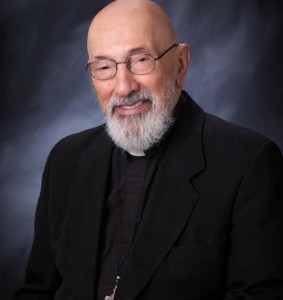Podcast: Play in new window | Download (Duration: 28:54 — 20.0MB) | Embed
Subscribe: Apple Podcasts | Spotify | Amazon Music | Android | Pandora | iHeartRadio | JioSaavn | Podchaser | Gaana | Podcast Index | Email | TuneIn | Deezer | Anghami | RSS | More

Remain In My Love – Building a Kingdom of Love with Msgr. John Esseff
Msgr. John Esseff and Kris McGregor discuss the concept of divine love and its expression through individuals. Msgr. Esseff emphasizes that it is not the individual’s love for God that matters most, but rather God’s love for humanity, demonstrated through the sacrifice of sending His son. He illustrates this with anecdotes of individuals, including children and married couples, who exemplify sacrificial love.
Msgr. Esseff argues that true holiness comes not from individual efforts to be virtuous but from allowing God’s love to flow through oneself. He emphasizes the importance of discernment in aligning one’s actions with God’s will, rather than pursuing personal agendas or virtue for its own sake. The role of parents in nurturing a spirit of sacrificial love in their children and highlights the transformative power of encountering the poor and suffering.
Discerning Hearts Reflection Questions:
- Understanding Divine Love: How does Msgr. Esseff differentiate between human love for God and God’s love for humanity, as discussed in the podcast?
- Role of Sacrificial Love: What examples of sacrificial love does Msgr. Esseff provide from the anecdotes shared in the podcast, and how do they illustrate the concept he is conveying?
- The Source of Holiness: According to the podcast, where does true holiness originate, and what implications does this have for personal spiritual growth?
- Discernment and God’s Will: What role does discernment play in aligning one’s actions with God’s will, as emphasized by Msgr. Esseff, and how can individuals cultivate this practice in their daily lives?
- Parental Influence and Family Life: How does Msgr. Esseff address the responsibility of parents in nurturing sacrificial love within their families, and what impact does this have on the spiritual development of children?
- Transformation Through Encountering Others: Reflecting on the anecdotes shared about encountering the poor and suffering, how can such experiences transform individuals’ perspectives on love and service?
From the Gospel of John 15:9-17:
Jesus said to his disciples:
“As the Father loves me, so I also love you.
Remain in my love.
If you keep my commandments, you will remain in my love,
just as I have kept my Father’s commandments
and remain in his love.“I have told you this so that my joy may be in you
and your joy might be complete.
This is my commandment: love one another as I love you.
No one has greater love than this,
to lay down one’s life for one’s friends.
You are my friends if you do what I command you.
I no longer call you slaves,
because a slave does not know what his master is doing.
I have called you friends,
because I have told you everything I have heard from my Father.
It was not you who chose me, but I who chose you
and appointed you to go and bear fruit that will remain,
so that whatever you ask the Father in my name he may give you.
This I command you: love one another.”
Msgr. John A. Esseff is a Roman Catholic priest in the Diocese of Scranton. He was ordained on May 30, 1953, by the late Bishop William J. Hafey, D.D. at St. Peter’s Cathedral in Scranton, PA. Msgr. Esseff served a retreat director and confessor to St. Teresa of Calcutta. He continues to offer direction and retreats for the sisters of the Missionaries of Charity around the world. Msgr. Esseff encountered St. Padre Pio, who would become a spiritual father to him. He has lived in areas around the world, serving in the Pontifical Missions, a Catholic organization established by St. Pope John Paul II to bring the Good News to the world especially to the poor. Msgr. Esseff assisted the founders of the Institute for Priestly Formation and continues to serve as a spiritual director for the Institute. He continues to serve as a retreat leader and director to bishops, priests and sisters and seminarians, and other religious leaders around the world.


